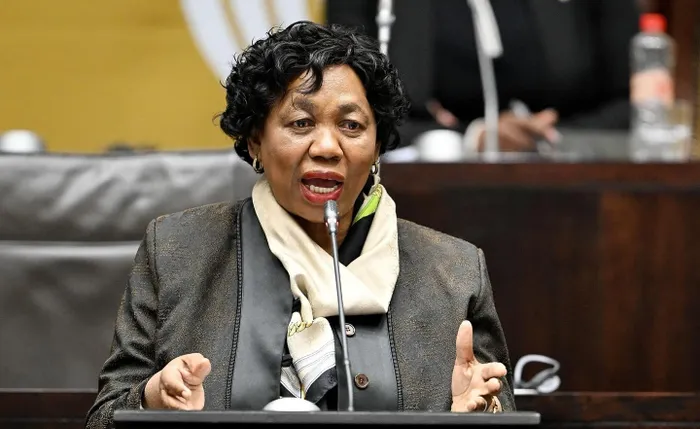Motshekga confirms no disciplinary action for SANDF chief for Iran comments

Defence Minister Angie Motshekga has confirmed that she had approved SANDF Chief Rudzani Maphwanya’s trip to Iraq and he will not face disciplinary action for comments the made in Tehran.
Image: Parliament of SA
Defence Minister Angie Motshekga said SANDF Chief Rudzani Maphwanya will not be facing any disciplinary action for the remarks he made while on a visit to Iraq.
Motshekga said this also applied to another defence official, Rear Admiral Prince Tshabalala, who penned an opinion piece in his personal capacity, defending Maphwanya’s visit.
Maphwanya caused a storm last month when it emerged that during a visit to Tehran, he pledged “common goals” with Iran and claimed his trip carried “a political message”.
The Department of International Relations and Cooperation publicly distanced itself from his comments while the Presidency described his visit as “ill advised”.
His trip, sanctioned by Motshekga, took place amid tensions between South Africa and the US, with President Donald Trump imposing a 30% tariff on South African goods.
Responding during a question-and-answer session in the National Assembly, Motshekga confirmed that she had approved Maphwanya’s trip.
“The Chief of Defense Force, as much as he is an appointee of the president, he reports directly to the minister and I approve his trips,” she said.
“So that trip was approved as late as last year, but unfortunately, for different reasons, it could not be undertaken. It was postponed again earlier this year, so this time, it was a third time that we tried to undertake the trip, and the permission was sought from the minister, like in any other department, where the head of department is authorised to travel by the minister responsible,” Motshekga said.
Asked by DA MP Chris Hattingh whether Maphwanya’s remarks complied with the Defence Act and Military Disciplinary Code for uniformed members, the minister said there was no evidence that he contravened the law.
“There is no evidence that the Chief of Defense Force contravened the provisions of the above Act.”
She also said she had asked for a copy of the speech Maphwanya read in Iran.
“I can confirm that that speech, even if it was said in France, it will not have created problems. It created problems because it was in Iran, at the wrong time because of these geopolitical conflicts.”
Regarding Tshabalala, Motshekga confirmed that he had written an opinion piece, in his private capacity, and it was allowed as long as it did not contradict the position of the department.
“Reading Admiral Tshabalala's opinion, there was also no legal or even policy contradiction of what he had said even in his personal capacity,” she added.
Hattingh said Motshekga’s response was exactly as expected, despite Maphwanya’s utterances which had been published internationally.
“There was no repudiation, apart from some reaction from Dirco as well as from the Presidency, but the Chief of the SANDF never denied that he said that.
“There is perhaps not sufficient legal evidence to pursue to a court (martial),” he added.
But, Motshekga said every department has the responsibility to push and advance international policies in respect of the areas of their work.
“The Chief of the Defence Force, as the policy head of defence, is expected to articulate what is the policy of the country on the matters of defence. So to articulate that as head of policy can’t be problematic. I want to repeat, maybe the member is right when he said that is what he expected because that's what it is. So he's expected exactly what it is.”
Motshekga said Dirco was aware of Maphwanya’s visit to Tehran since every embassy has a defense attaché, who assist with logistics and gives them information about issues in the country they travel to.
“Traveling is not necessarily sought from Dirco, but the information of what needs to be raised or attended to is. It will be a joint information exercise that we will get from our offices which work with Dirco, wherever we are going,” she added.
mayibongwe.maqhina@inl.co.za
Related Topics: